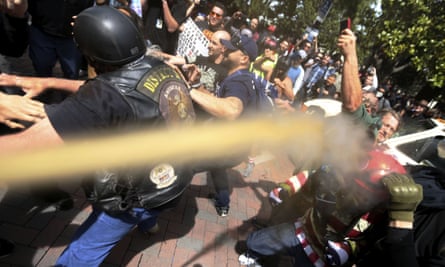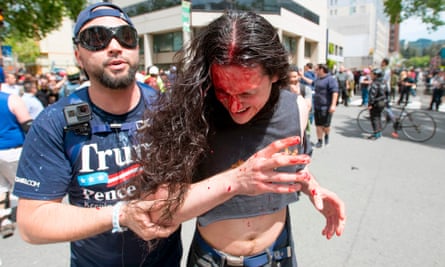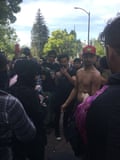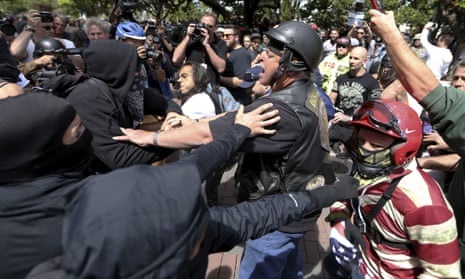Hundreds of self-described anti-fascist protesters and supporters of Donald Trump clashed in Berkeley, California, in sporadic brawls on Saturday. Protests in cities around the rest of the country, including a number of “tax marches” in which demonstrators called for Trump to release his tax returns, proceeded more peacefully.
In Berkeley, police told media they had arrested 13 people by mid-afternoon, as opposing rallies spilled out of a park and into the streets.
With several hundred people on each side, the crowds mostly taunted each other with bullhorns, chants and shouts. Occasionally, anti-Trump protesters threw fireworks. Small bands on both sides chased each other or brawled, sometimes with wooden planks, homemade shields, poles and pepper spray.
One standoff at a downtown intersection ended only when a smoke grenade detonated. In confusion, anti-Trump protesters fled as supporters of the president charged after them, attacking stragglers. In one altercation, demonstrators threw a pot of beans at each other, the food mostly spilling onto the street.

In another altercation, a protester who stole a Trump flag was chased down in front of a store and punched, until allies ran to his side and started to beat the Trump supporter involved. As with the other fights, it was eventually separated. At least a dozen people were seen bloodied or suffering the effects of pepper spray.
The first event planned for Saturday was a “pro-free speech rally” by a group of Trump supporters. Opposing groups quickly organized their own event.
Demonstrators in both camps bemoaned how hard it was to communicate with the other side, though occasionally they came together, often helping bystanders caught off guard. At one point an anti-fascist shared her marijuana with a Trump supporter. For most of the day, each side shouted slogans, like “neo-fascists got to go” and “just plain commies off the streets”.
Unlike previous clashes in Berkeley – such as a February protest that forced the far-right writer Milo Yiannopoulos to cancel an event, and a March rally that led to 10 arrests – Trump supporters numbered at least as many if not more than their rivals. At one point an older man shouted: “I claim Berkeley for the alt-right.”
Lauren Southern, a Canadian activist popular in rightwing media, similarly declared: “We won the battle of Berkeley!”
By 4pm local time, the various factions had mostly dispersed, leaving streets by and large calm and the park quiet.
“They picked Berkeley because they want to feel they could do this in the most liberal place in the country,” said Geoff Millard, an anti-Trump protester, Iraq war veteran and Mr San Francisco Leather 2017. “It’s important that we shut them down and let them know they can’t pull this crap here.”
Millard said the “antifascist” protest was meant “to make Nazis afraid” and said “the ideology that they propose puts public citizens at risk”.

Others against the president variously argued that there were limits to free speech or that their goal was to use their own voices to overwhelm and marginalize certain views that have appeared on the far right, for instance antisemitism and racism.

Several Trump supporters said they also felt uncomfortable about those elements. One man, who would describe himself as a Trump supporter from the Bay area, held a sign that read “Da Goyim Know” next to an image of a cross. He said the sign “means we’re sick of living under neocon rule”.
“I think there are too many Jewish supremacists in the government and in the media,” he said. “If people of European descent want to stand up for their rights and just want equal rights, they’re called white supremacists.”
Accusations of antisemitism, he said, were used “to justify anti-white racism”.
Trump supporters nearby said they did not agree, and stressed the eclectic mix of ideas on their side: self-described “non-progressives”, libertarians, populists, “traditionalists”, reluctant converts, and a faction called the Proud Boys: a Bay area group of men, mostly in their 30s, who call themselves “western chauvinists”.
One Proud Boy, who called himself Nick Money, said he was a Bernie Sanders supporter until he had “an awakening” last year. His group was providing security for Southern, who has previously encouraged Trump supporters take action in self-defense against “disgusting antifa scum”. In a video earlier this year, she said: “While we should never start a fight we should always end it.”

Despite Saturday’s scuffles, however, partisans on both sides mostly mocked and berated each other, phones and cameras raised. Police broke up fights but mostly stood apart. A solitary vendor appeared for the usual Saturday farmers market, which was canceled, and a Berkeley stalwart who calls himself Common Terry shouted that Trump supporters “hate our farmers market”.
Nearby, an “empathy tent” stood empty of protesters, though a volunteer said she had helped several people from both sides there, just before a man in a “Make America Great Again” hat stopped by to pick up a jacket his wife had left behind.
‘What are his conflicts of interest?’
A peaceful mood reigned at marches in more than 100 other cities across the US on Saturday, as protesters demanded the release of the president’s personal tax returns.
In Washington, protesters rallied on the west lawn of the Capitol before a march to the Lincoln Memorial. Many wore pink knitted hats with “pussy ears”, which were first seen en masse at the Women’s March in the capital in January.
Audrey Wagner, a DC resident, questioned the motives behind Trump’s refusal to release his tax returns.
“We need to know: what are his conflicts of interest? Does he have ties to Russia?” she said.

Other protesters carried signs that remarked on the president’s frequent visits to Mar-a-Lago, his private resort in Palm Beach, Florida where he is spending the Easter weekend with his family. Hundreds of activists marched there too, meeting a group of Trump supporters. Florida police reported no violence.
In DC, lawmakers including Ron Wyden, Maxine Waters and Jamie Raskin addressed the crowd. Wyden, the ranking Democrat on the Senate finance committee, has introduced legislation that would require sitting presidents, including Trump, to release their tax returns for the past three years. Trump has refused to release his returns, breaking with more than 40 years of precedent.
Trump said during the campaign that he would release his returns when the audit was complete. But after his inauguration, aide Kellyanne Conway said the president would not release his tax returns and that “people didn’t care”.
Amanda Taub, a professor at Vermont Law School, told the Guardian this week Conway’s comments sparked the idea for a Tax Day march.
“Trump said people don’t care about his tax returns,” said one marcher in Washington on Saturday, Michelle Lee, from nearby Alexandria, Virginia. “That’s clearly not the case. So get off the golf course and show us what you’re hiding.”
Pieces of Trump’s tax history have dribbled out, including two pages of Trump’s 2005 returns and documents from his 1995 filing, which showed a $916m loss and that Trump could have used a loophole to legally avoid federal income taxes for over a decade.
